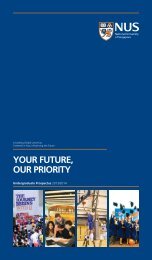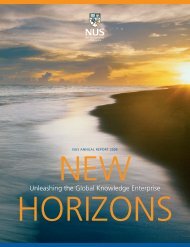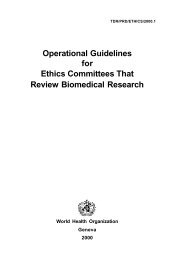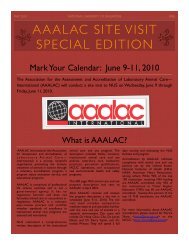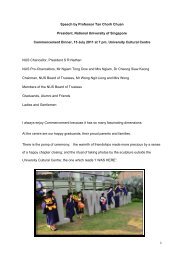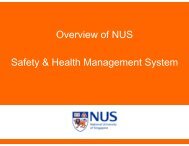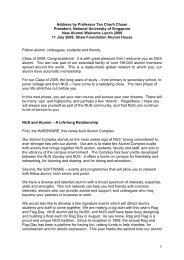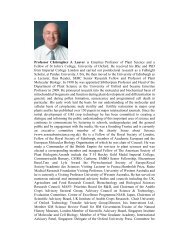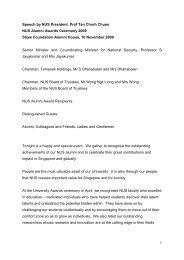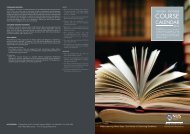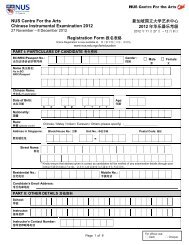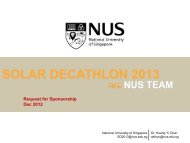to view the article featuring NERI
to view the article featuring NERI
to view the article featuring NERI
Create successful ePaper yourself
Turn your PDF publications into a flip-book with our unique Google optimized e-Paper software.
<strong>NERI</strong><br />
An interdisciplinary institute<br />
To begin, what are <strong>the</strong> main<br />
aims of <strong>the</strong> National University<br />
of Singapore Environmental Research<br />
Institute (<strong>NERI</strong>) as a whole?<br />
<strong>NERI</strong> aims <strong>to</strong> establish <strong>the</strong> National University<br />
of Singapore (NUS) as a leading global institute<br />
for interdisciplinary research, education<br />
and expertise in environmental science and<br />
technology in Asia. The Institute coordinates and<br />
facilitates cross-faculty research and educational<br />
activities <strong>to</strong> conduct cutting-edge research<br />
addressing critical environmental issues. It also<br />
proactively seeks external partnerships and<br />
collaborations such as government agencies<br />
and industries from across <strong>the</strong> world <strong>to</strong> address<br />
pressing environmental issues.<br />
Can you highlight <strong>the</strong> key activities and<br />
research programmes in which <strong>NERI</strong> is<br />
currently involved?<br />
The current key research tracks are:<br />
• Environmental Surveillance and Treatment<br />
• Environmental and Human Health<br />
• Green Chemistry and Sustainable Energy<br />
• Impacts of Climate Change on <strong>the</strong> Environment<br />
<strong>NERI</strong> also initiates major research<br />
programmes with international universities<br />
and relevant agencies in Singapore with<br />
substantial funding from <strong>the</strong> Singapore<br />
Government. Currently <strong>the</strong>se are <strong>the</strong><br />
Singapore Peking Oxford Research Enterprise<br />
(SPORE) on Water Eco-efficiency, and Energy<br />
The National University of Singapore Environmental Research Institute<br />
aims <strong>to</strong> coordinate, integrate, and facilitate research and<br />
educational initiatives across NUS <strong>to</strong> address critical<br />
environmental <strong>to</strong>pics. Professor Ong Choon Nam,<br />
Direc<strong>to</strong>r of <strong>the</strong> Institute, discusses <strong>the</strong>ir<br />
research strategy<br />
and<br />
Environmental<br />
Sustainability Solutions for Megacities (E2S2).<br />
To what extent is Nature an important<br />
source of knowledge and inspiration for<br />
developing new environmental technologies?<br />
Observing and studying Nature provides<br />
answers <strong>to</strong> most questions about how things<br />
work in <strong>the</strong> living world. It is our motivation <strong>to</strong><br />
find similar mechanisms that can be applied <strong>to</strong><br />
current environmental challenges.<br />
Through our studies of certain mangrove<br />
species with special desalination abilities and<br />
of certain fish species that can rapidly adapt<br />
<strong>to</strong> survive in highly saline and fresh waters,<br />
we hope <strong>to</strong> generate insight in<strong>to</strong> developing<br />
novel, bio-inspired desalination devices and<br />
applications for <strong>the</strong> future.<br />
What exciting progress have you made<br />
on waste <strong>to</strong> energy conversion using<br />
microbial processes?<br />
Plant waste is <strong>the</strong> most voluminous waste<br />
worldwide. However, 70 per cent of plant<br />
biomass is lignocellulose, which does not easily<br />
undergo biodegradation. Our research team<br />
has been conducting studies in<strong>to</strong> peatland<br />
dynamics using system-level technologies such<br />
as metagenomics and metabolomics, combined<br />
with cus<strong>to</strong>m computational platforms. These<br />
technologies<br />
have allowed<br />
<strong>the</strong>m <strong>to</strong> characterise<br />
consortia of microbes,<br />
describe <strong>the</strong>ir natural<br />
physicochemical environment and<br />
develop an understanding of <strong>the</strong>ir metabolic<br />
processes. From this knowledge base, our team<br />
has identified novel enzymes and pathways<br />
<strong>to</strong> enhance biodegradation of lignocellulosic<br />
wastes. Novel bioprocesses are currently being<br />
developed by combining <strong>the</strong> microbial ecology<br />
and physicochemical parameters which we<br />
hope will provide innovative solutions for<br />
utilising <strong>the</strong> world’s largest resource of waste.<br />
How is your research focused on developing<br />
practical, user-based solutions <strong>to</strong><br />
environmental issues? Can you expand on<br />
some of <strong>the</strong> solutions you are developing?<br />
Though <strong>NERI</strong> is tasked <strong>to</strong> focus on upstream<br />
research, it also collaborates with industrial<br />
partners <strong>to</strong> develop practical user-based<br />
solutions. With industry, we are currently<br />
developing:<br />
• Environmental Biomoni<strong>to</strong>ring – aiming <strong>to</strong><br />
use small aquarium fishes (such as zebrafish)<br />
coupled with molecular-biochemical<br />
approaches for moni<strong>to</strong>ring contaminants of<br />
emerging concern (CEC) in water<br />
• New Generation Smart Water Assessment<br />
Network (NUSwan) – developing and testing<br />
an instrument intended <strong>to</strong> conduct extensive<br />
environmental and water data collection with<br />
lesser human intervention and efficiently<br />
cover a wide range of data points<br />
48 INTERNATIONAL INNOVATION
<strong>NERI</strong><br />
Interdisciplinary<br />
innovations<br />
<strong>NERI</strong> brings <strong>to</strong>ge<strong>the</strong>r researchers from different disciplines, institutions,<br />
government agencies, international organisations and industry <strong>to</strong><br />
tackle critical environmental challenges that face <strong>the</strong> world <strong>to</strong>day<br />
• Engineered Nanomaterials – investigating<br />
potential <strong>to</strong>xicity of exposure <strong>to</strong> engineered<br />
nanomaterials through exploring <strong>the</strong>ir<br />
behaviour in biological systems and <strong>the</strong>ir<br />
implications for <strong>the</strong> environment and health<br />
• Microbial Fuel Cells (MFC) – an eco-friendly<br />
wastewater treatment technique generating<br />
bioelectricity from biomass using bacteria. Our<br />
research team is developing more cost-effective<br />
and sustainable catalysts that could achieve<br />
bioelectricity generation with higher efficiency<br />
• Solventless and Solvent-minimised Extraction<br />
– green analytical chemistry involves<br />
designing analytical methods that minimise<br />
<strong>the</strong> use and generation of hazardous<br />
substances. Our team is developing an<br />
environmentally-friendly analytical method<br />
that combines solvent minimised extraction<br />
procedure and statistical calculation<br />
technique <strong>to</strong> reduce <strong>the</strong> amount of solvents<br />
required in <strong>the</strong> analysis of pollutants in<br />
environmental waters<br />
Can you offer an insight in<strong>to</strong> <strong>NERI</strong>’s vision<br />
moving forward?<br />
<strong>NERI</strong> envisions itself as playing a major role<br />
in addressing environmental sustainability<br />
in Sou<strong>the</strong>ast Asia. The Institute is directed<br />
<strong>to</strong>wards addressing regional issues through<br />
collaborations with Singapore’s neighbouring<br />
countries. This will entail sharing and<br />
working with regional governments <strong>to</strong><br />
provide greater opportunities <strong>to</strong> address<br />
challenges beyond Singapore.<br />
THE NATIONAL UNIVERSITY of Singapore<br />
Environmental Research Institute (<strong>NERI</strong>)<br />
initiates and coordinates interdisciplinary<br />
work on <strong>the</strong> environment by bringing <strong>to</strong>ge<strong>the</strong>r<br />
faculties from across <strong>the</strong> University as well as<br />
collaborating with international experts from<br />
renowned institutions worldwide. Focusing<br />
particularly on issues affecting Singapore and<br />
Asia, <strong>the</strong> Institute is working <strong>to</strong> establish itself<br />
as a leading global centre for forward-thinking<br />
research on <strong>the</strong> environment.<br />
The varied academic backgrounds of <strong>the</strong><br />
Institute’s Direc<strong>to</strong>r, Professor Ong Choon Nam,<br />
whose research is largely in environmental<br />
health, and of Deputy Direc<strong>to</strong>rs Dr Ong Say<br />
Leong, an environmental engineer <strong>to</strong>ge<strong>the</strong>r<br />
with Dr Sanjay Swarup, an environmental<br />
microbiologist, exemplify <strong>the</strong> interdisciplinary<br />
principles on which <strong>NERI</strong> is founded.<br />
SUPPORTING<br />
INTERDISCIPLINARY STUDIES<br />
Alongside research work, <strong>the</strong> Institute hosts<br />
educational activities, such as cross-disciplinary<br />
seminar series and training, <strong>to</strong> share knowledge,<br />
build expertise and facilitate collaborative<br />
work among faculties from different disciplines<br />
<strong>to</strong>wards environmental research. Its state-of-<strong>the</strong>art<br />
labora<strong>to</strong>ry facilities, equipment and trained<br />
personnel support a high standard of novel<br />
research. The interdisciplinary strategy makes<br />
<strong>the</strong> National University of Singapore (NUS)<br />
a significant contribu<strong>to</strong>r in addressing critical<br />
environmental issues and reaching ‘innovative<br />
solutions for sustainable development’, one of<br />
<strong>the</strong> missions outlined by Choon Nam.<br />
By consistently building relationships and<br />
initiating projects between researchers across<br />
disciplines, both internally and externally,<br />
environmental sustainability issues are<br />
approached using new perspectives. As <strong>the</strong> poin<strong>to</strong>f-contact<br />
for NUS environmental research,<br />
<strong>NERI</strong> matches <strong>the</strong> needed skills and expertise <strong>to</strong><br />
implement projects and cover new grounds of<br />
research. The Institute also facilitates sharing of<br />
ideas by providing platforms for disseminating<br />
information and encouraging researchers <strong>to</strong><br />
publish in peer-re<strong>view</strong>ed journals.<br />
<strong>NERI</strong> has built on its credible reputation<br />
and track record <strong>to</strong> establish collaborations<br />
beyond academia. The strategic partnerships<br />
with government agencies and industry<br />
demonstrate <strong>the</strong> Institute’s cutting-edge<br />
research with far-reaching impacts ensuring<br />
that research creates practical sustainable<br />
solutions <strong>to</strong> address environmental problems<br />
throughout Asia and beyond.<br />
MODELLING MEGACITIES<br />
FOR SUSTAINABLE SOLUTIONS<br />
<strong>NERI</strong> is hosting <strong>the</strong> recently established<br />
Programme on Energy and Environmental<br />
Sustainability Solutions (E2S2), a collaborative<br />
initiative between NUS and Shanghai Jiao<br />
Tong University in China and includes<br />
several international companies in China and<br />
Singapore. It is supported by <strong>the</strong> Singapore<br />
National Research Foundation and <strong>the</strong><br />
Shanghai Municipal Government. The research<br />
team is addressing challenges in megacities<br />
that can be useful <strong>to</strong> strategic policy makers,<br />
environmental scientists and engineers.<br />
Singapore and Shanghai have been selected<br />
as <strong>the</strong> first two test-bedding sites because of<br />
<strong>the</strong>ir different sizes and complexities. Data<br />
ga<strong>the</strong>red from <strong>the</strong>se two cities will enable<br />
<strong>the</strong> development of a sustainable platform<br />
WWW.RESEARCHMEDIA.EU 49
INTELLIGENCE<br />
<strong>NERI</strong><br />
NATIONAL UNIVERSITY OF<br />
SINGAPORE ENVIRONMENTAL<br />
RESEARCH INSTITUTE<br />
OBJECTIVES<br />
To establish NUS as a leading global centre<br />
of interdisciplinary research, education,<br />
and expertise in <strong>the</strong> Environment field,<br />
particularly in issues affecting Singapore<br />
and Asia.<br />
KEY COLLABORATORS<br />
Professor Ong Choon Nam • Professor<br />
Ong Say Leong • Associate Professor<br />
Sanjay Swarup • Professor Li Fong Yau,<br />
Sam • Professor Lee Hian Kee • Professor<br />
Peter Ng Kee Lin • Associate Professor<br />
Tong Yen Wah<br />
FUNDING<br />
National University of Singapore<br />
• Singapore National Research<br />
Foundation • Environment and Water<br />
Technology Programme Office • National<br />
Environment Agency • National Medical<br />
Research Council • Singapore Economic<br />
Development Board • Industry<br />
CONTACT<br />
Ong Choon Nam, PhD<br />
Direc<strong>to</strong>r, NUS Environmental Research<br />
Institute<br />
Professor, School of Public Health<br />
NUS Environmental Research Institute<br />
National University of Singapore<br />
#02-01, T-Lab Building,<br />
5A Engineering Drive 1<br />
Singapore 117411<br />
T +65 6516 4982 or 6516 7542<br />
E erisec@nus.edu.sg<br />
www.nus.edu.sg/neri<br />
ONG CHOON NAM is an environmental<br />
<strong>to</strong>xicologist by training. He is a professor<br />
of Public Health and presently Direc<strong>to</strong>r<br />
of National University of Singapore<br />
Environmental Research Institute. Beyond<br />
<strong>the</strong>se roles, Ong also works as advisor<br />
<strong>to</strong> <strong>the</strong> World Health Organization, US<br />
National Water Research Institute, and<br />
<strong>the</strong> International Life Sciences Institute.<br />
He is an edi<strong>to</strong>rial board member of several<br />
environmental journals, a scientific advisor<br />
<strong>to</strong> <strong>the</strong> China Center of Disease Control<br />
(CDC) and has chaired <strong>the</strong> Expert Panel for<br />
NEWater.<br />
<strong>to</strong> facilitate <strong>the</strong> understanding, design and<br />
implementation of future sustainable solutions<br />
for coupled problems in megacities. The<br />
Programme is developing capabilities necessary<br />
<strong>to</strong> solve problems characteristic of complex<br />
cities. These capabilities can <strong>the</strong>n be transferred<br />
<strong>to</strong> different environments and benefit cities of<br />
various sizes and complexities. The research is<br />
focusing particularly on waste management<br />
for energy recovery and on <strong>the</strong> challenges of<br />
emerging contaminants. A distributed cloud<br />
system will be used for large-scale urban<br />
sensing and data management <strong>to</strong> support <strong>the</strong><br />
two central areas of study <strong>to</strong>wards missionorientated<br />
system modelling that can be<br />
similarly adapted by o<strong>the</strong>r megacities.<br />
A NATURAL<br />
APPROACH TO DESALINATION<br />
A large part of <strong>NERI</strong>’s work on water ecoefficiency<br />
is biomimicry, observing and studying<br />
nature <strong>to</strong> find solutions for environmental<br />
challenges. Supplies of fresh water sources are<br />
limited across <strong>the</strong> globe. Through biomimicry,<br />
<strong>NERI</strong> scientists are trying <strong>to</strong> find more energyefficient<br />
methods for water desalination.<br />
Strategic partnerships with<br />
government agencies and industry<br />
demonstrate <strong>the</strong> Institute’s<br />
cutting-edge research with farreaching<br />
impacts<br />
Mangrove species flourish along coastal<br />
regions due <strong>to</strong> <strong>the</strong>ir special desalination<br />
capacity. The leaf surfaces of mangroves<br />
contain microscopic salt glands that rid tissues<br />
of excess salts through secretions. As <strong>the</strong>re is<br />
little knowledge about nature’s desalination<br />
mechanism in mangroves, <strong>NERI</strong> scientists have<br />
been motivated <strong>to</strong> study <strong>the</strong>m <strong>to</strong> find insights<br />
for future desalination methods. A team of<br />
environmental physiologists and chemists is<br />
tracking <strong>the</strong> water movement in <strong>the</strong>se glands<br />
<strong>to</strong> investigate <strong>the</strong> role of aquaporins in <strong>the</strong><br />
desalination process. Using molecular biology<br />
and proteomic approaches, researchers are<br />
also exploring o<strong>the</strong>r membrane proteins that<br />
may be involved in facilitating <strong>the</strong> secretion<br />
of salts. Their work aims <strong>to</strong> understand <strong>the</strong><br />
operative system of <strong>the</strong>se glands in order<br />
<strong>to</strong> build a model for desalination that can<br />
be pivotal in developing novel, bio-inspired<br />
desalination devices and applications.<br />
The adaptive nature of certain fish species,<br />
such as African tilapia (Oreochromis sp.) also<br />
holds potential for educating us onadaptation<br />
and resilience within a changing environment.<br />
African tilapias can survive in both saline and<br />
fresh waters, offering ano<strong>the</strong>r desalination<br />
model for study. Working in collaboration, fish<br />
biologists, chemists and engineers will obtain<br />
‘architectural insights’ of <strong>the</strong> cellular structures<br />
involved in <strong>the</strong> desalination mechanism within<br />
<strong>the</strong> gills. This study will stimulate ideas for<br />
building an innovative water treatment system<br />
using potential biomaterials mimicked from<br />
euryhaline fish, better preparing us <strong>to</strong> deal with<br />
fresh water shortages and climate change.<br />
ENVIRONMENTAL WORKS<br />
ACROSS ASIA AND BEYOND<br />
In line with <strong>NERI</strong>’s aim of becoming a leading<br />
global environmental research institute centred<br />
in Asia, <strong>the</strong> Institute is involved in a number of<br />
initiatives spanning across <strong>the</strong> region.<br />
The NUS Centre for Climate Change Studies<br />
(C3S), <strong>the</strong> point-of-contact for climate change<br />
studies, and an initiative of <strong>NERI</strong>, is currently<br />
being established. The programme will carry<br />
out multidisciplinary research in vulnerability,<br />
adaptation and mitigation of climate change<br />
impacting Singapore and <strong>the</strong> wider region. The<br />
research includes collaborations with local and<br />
regional institutions, agencies and industries<br />
<strong>to</strong> obtain large data samples and disseminate<br />
information <strong>to</strong> a wider scope of parties.<br />
Working with two different institutions in<br />
Indonesia (Universitas Jambi and LIPI), <strong>NERI</strong> is<br />
investigating peatlands dynamics. By studying<br />
<strong>the</strong> functionality of tropical peatlands, options<br />
for different management solutions can<br />
be evaluated and developed, contributing<br />
<strong>to</strong> improved overall peatlands ecosystem<br />
management. Hopefully, <strong>the</strong>se studies can be<br />
extended out <strong>to</strong> o<strong>the</strong>r parts of Sou<strong>the</strong>ast Asia<br />
in <strong>the</strong> future.<br />
NUS researchers also participate in <strong>the</strong> Seven<br />
Sou<strong>the</strong>ast Asian Studies (7SEAS) programme, a<br />
large-scale collaborative project with NASA, US<br />
Navy and many regional agencies <strong>to</strong> tackle <strong>the</strong><br />
issues of transboundary emissions.<br />
Senior members of <strong>NERI</strong> have been involved in<br />
advising international bodies, such as <strong>the</strong> World<br />
Health Organization, and federal agencies like<br />
<strong>the</strong> US National Water Research Institute, on<br />
drinking water guidelines and environmental<br />
policies. Such involvements are perceived<br />
<strong>to</strong> increase and will help <strong>NERI</strong> <strong>to</strong> build its<br />
thought leadership and keep abreast with <strong>the</strong><br />
advancement of innovative and sustainable<br />
environmental research.<br />
50 INTERNATIONAL INNOVATION



